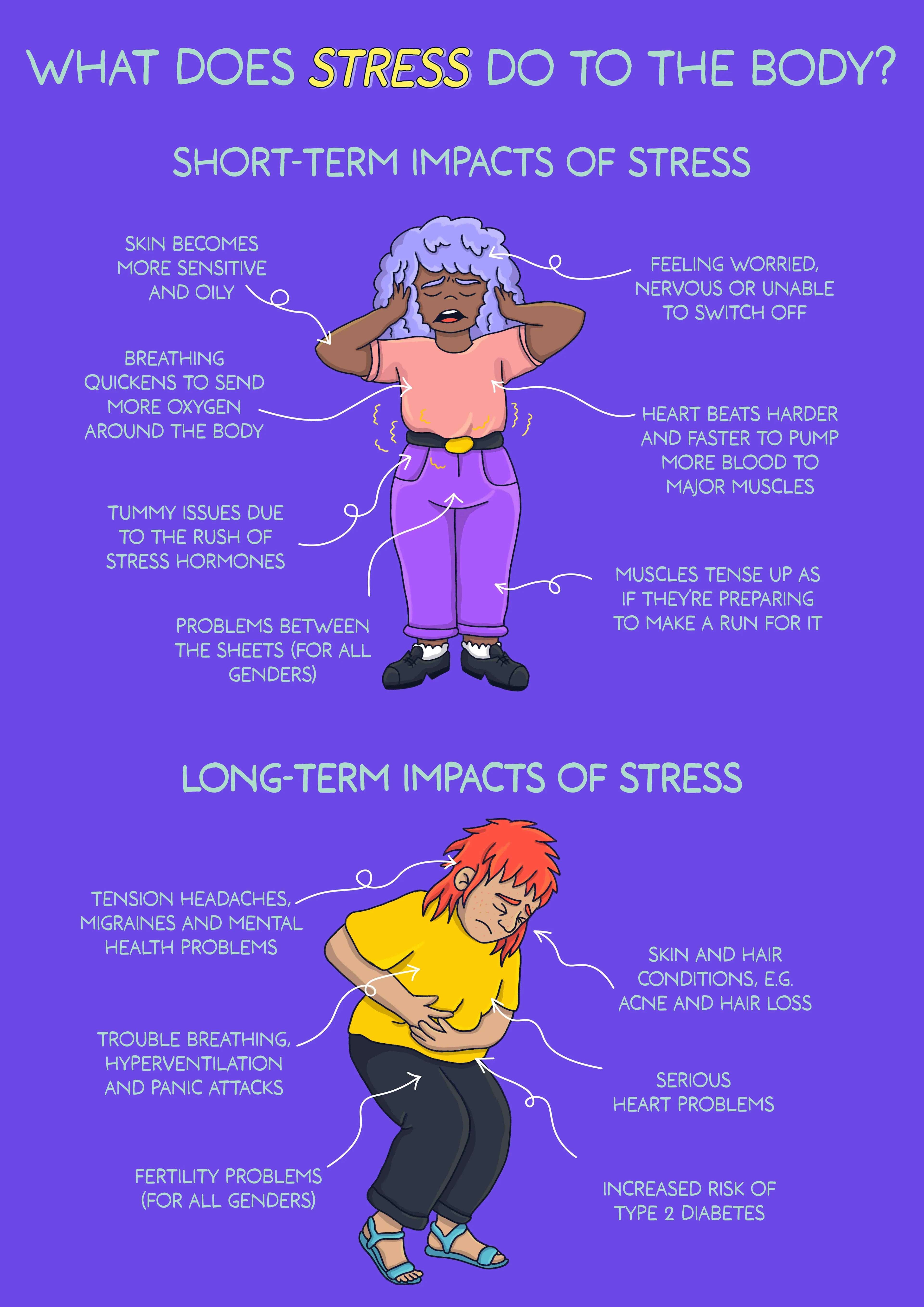What does stress do to the body?
It’s normal to feel stressed sometimes, but if you always feel under-the-pump it can have a really negative impact on your mind and body. This is because stress is supposed to be a short-term response to danger and not a constant state of being. If you understand the signs of stress that you’re experiencing, you’ll be better placed to keep it under control.
Is stress always bad?
Feeling stressed can be normal, healthy and helpful – depending on the situation. Stress is the fight-or-flight response that gets you through job interviews, impromptu speeches and those awkward encounters with your ex. In these situations, stress helps you to overcome a short-term challenge that you know you can handle. It’s only a problem when it’s constant or the situation is out of your control. At times like these, it’s important to know how to deal with stress.
What are the symptoms of stress?
When your body senses danger, it releases stress hormones that cause short-term physical changes. These changes help you to stay focused and alert until things are under control. However, if stress is constant and these changes persist, they can lead to serious problems in the long term.
Download infographic transcript.
Stress and the nervous system
When your stress response doesn’t stop firing, it can cause you to feel worried, nervous or unable to switch off. This can lead to tension headaches and migraines. Chronic stress can wear you down and lead to more serious mental health problems, such as anxiety or depression.
Signs of stress on the respiratory system
When you’re stressed, your breathing quickens to send more oxygen around the body. If you have an existing respiratory condition such as asthma, this can make it harder to breathe. If you aren't able to reduce the stress you're experiencing, it can also lead to hyperventilation and panic attacks.
Cardiovascular stress
Stress causes your heart to beat harder and faster so that it can pump more blood to your major organs and muscles. This will give you more strength to take action, but it can also raise your blood pressure. If that happens regularly, it puts a strain on your heart, which can lead to serious heart problems.
If you are concerned that you're showing symptoms of stress in your heart rate, check out this app which reads your heart rate from your fingers pulse. If you notice your heart rate is high, book in a session with your local GP to discuss the physical symptoms of stress that may be affecting your body.
Digestive problems caused by stress
Your liver produces extra glucose when you’re under stress, to give you a boost of energy. If this happens regularly, your body will have trouble breaking down the extra glucose, leading to an increased risk of type 2 diabetes.
Due to the rush of stress hormones, you could also get an upset stomach or have acid reflux from the increased stomach acid produced.
Signs of stress on the reproductive system and sexuality
Stress is exhausting for your mind and body, so it’s common to have a reduced desire to have sex. If you’re under constant stress, this can also lead to fertility problems.
Symptoms of stress on the muscular system
Since more blood is being pumped to your muscles, they tense up to prepare for the fight-or-flight response and to protect your body from injury. Usually your muscles release again, but if you’re always under stress, they might not get the chance to relax. Tight muscles can lead to back, neck and shoulder pain, headaches and body aches.
Stress and the immune system
Your body’s stress response stimulates the immune system, which can help in healing wounds and injuries. Over time, though, the symptoms of stress can weaken your immune system, which makes you more vulnerable to catching infections and getting sick. The effects of stress can also cause your body to take longer to recover from illnesses.
Signs of stress on the integumentary system (skin and hair)
When your body produces more stress hormones, it causes an increase in oil production. Your skin becomes more sensitive and oily, which over time can cause acne. Hair loss can also be a physical symptom of stress.
What can you do if you're showing physical signs of stress?
Learning about the effects of stress on the body and how to manage stress will help you to feel happier and healthier in the long run. Coping with stress is about trying to solve the problems that are within your control and learning to accept the things you can’t change. We’ve come up with four questions to ask yourself the next time you’re feeling stressed, to help you decide on your next move.
How to deal with stress right now?
Practising mindfulness is a great way to reduce stress. Check out these 5 ways to be mindful without meditating.
Find out your chill style and make time for chilling out. You’ll feel happier and healthier.
Take a moment to check out this simple quiz, to see how you’re really going.
Explore these other guides on how to deal with stress, reduce anxiety and practice self-care.
